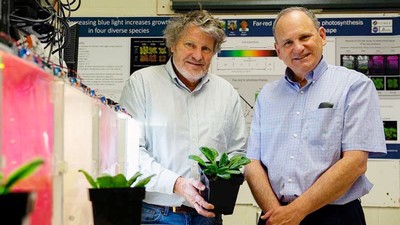USU's ETE Publishes Open Access Book on Teaching in the AI Era
By Marcus Jensen |
LOGAN, Utah — A new book edited by Utah State faculty, Teaching and Generative AI, seeks to provide educators with guidance and resources for navigating the possibilities and challenges of teaching in an AI era.
The book is the fifth installment in the Empower Teaching Open Access Book Series from the Center for Empowering Teaching Excellence at USU. The book, which was released April 18, is titled Teaching and Generative AI: Pedagogical Possibilities and Productive Tensions. The book was compiled by Travis Thurston, director of Teaching Excellence at USU, and Beth Buyserie, director of composition in the USU Department of English.
The book features six sections and 35 chapters written by various authors, including several written by USU faculty and students. These authors were guided to consider both the possibilities and the productive tensions and consider the types of ethical considerations and practical applications of AI within the context of their own classrooms. Authors come from a variety of disciplines, as AI is poised to impact all disciplines in one way or another.
"We wanted this book to be interdisciplinary and accessible for teachers, librarians and instructional designers from a wide range of disciplines and institutional contexts,” Buyserie said. “Because AI affects all educational settings, we designed this book to encourage interdisciplinary dialogues around the possibilities and challenges for using AI to enhance learning."
With the rapid development of generative AI programs, the way educators need to approach both teaching and learning promises to change. The collection features chapters focused on research studies involving the use of AI in college classrooms, explorations of the ethical and practical considerations of AI, and specific examples of activities that can be replicated or adapted to use with students as soon as tomorrow. The book also contains prompts that can promote discussion among faculty members as they learn and adapt together.
"We hope that it will spark discussion and reflection as AI becomes more ubiquitous, so we included a number of reflection and discussion prompts throughout the book making it ideal for learning circles or book clubs,” Thurston said. “We want to nudge readers to really consider their own context when making decision on how, when, or why AI might be used in their classrooms."
Written for educators who are facing an unprecedented technological shift, the book provides teachers, librarians and instructional designers with practical and thoughtful pedagogical resources for navigating the potential avenues, pitfalls, tensions and benefits. The authors in the collection do not praise or criticize AI, but thoughtfully acknowledge and explore its complexities within the educational setting.
"This book serves as a guide for college instructors who find themselves at the cusp of this technological revolution — those who are intrigued yet perhaps apprehensive, eager to explore yet unsure where to begin,” said Tazin Daniels, associate director of the Center for Research on Learning and Teaching at the University of Michigan. “As you delve into the pages of this book, you are invited to explore the vast potential of generative AI to revolutionize teaching and learning while grappling with the ethical and societal questions it raises."
The Empower Teaching Open Access Book Series features a variety of peer-reviewed books focused broadly on the multi-disciplinary work of teaching in higher education. Books in the series align with the mission of the ETE to build cultures of teaching excellence for students, staff, faculty and administrators. The books in this series share insightful and innovative perspectives on teaching and learning, and through a partnership with USU Libraries the books are offered in an online and open-access format to amplify the voices of authors and contributors in the series.
The book is available for viewing on the ETE web page now. Print and PDF versions of Teaching and Generative AI will be available beginning in May.
WRITER
Marcus Jensen
News Coordinator
University Marketing and Communications
marcus.jensen@usu.edu
CONTACT
Travis Thurston
Director of Teaching Excellence
Center for Empowering Teaching Excellence
435-797-4950
travis.thurston@usu.edu
Comments and questions regarding this article may be directed to the contact person listed on this page.







